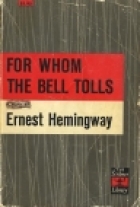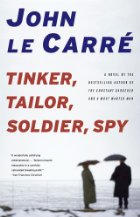

I don't read a lot of war literature, so it's noticeable when I'm suddenly experiencing two stories of war back-to-back. David and I spent a few weeks listening to John Le Carré's Tinker, Tailor, Soldier, Spy, and I kicked off the 9 for '09 challenge by reading Ernest Hemingway's For Whom the Bell Tolls. I tend to find Hemingway subtly optimistic, less dark than his reputation would lead one to believe. Sure, his characters are wounded and adrift in a harsh world, but there's always that glint of hope beckoning from afar, whether in nature, a quiet moment between friends or lovers, or the shooting of innocent animals, that hints at the redeemable nature of humanity. Nevertheless, I was not prepared to read Papa as the little ray of sunshine he seems in comparison to John Le Carré.
It is very tempting to read the differences in these two novels as representing the zeitgeists of their respective wars: in the Spanish Civil War of For Whom the Bell Tolls, the characters still believe that they are fighting for an ideal, that their actions, however horrific, can have an important and lasting effect on the country and the world. Concepts like "freedom" and "The Republic" are bandied about with un-ironic conviction, and romantic love is a saving force, even if cut short. When characters are thrown into doubt, despair, or fear, which happens frequently, they pull themselves out of it with some brusque self-talk about the ideals of the Republic. Even when they do things in the name of their cause of which they are later ashamed (as in Pilar's gruesome description of a mob massacre in her small town of origin), that shame is largely kept separate from the untarnished ideals for which they are fighting.
In the late Cold War Britain of Le Carré, on the other hand, any idealism has faded into a memory so distant and exhausting that it's not even nostalgic anymore. The characters perform their actions out of habit, and out of an idea that they have spent too long spooking around for "The Circus" to think of changing now. From a moral perspective East and West are largely indistinguishable, so tasks like ferreting out a Russian mole are performed by exhausted career spies as a matter of course, rather than by fiery young ideologues in a lather of righteous indignation. There are a plethora of scenes where the protagonist, George Smiley, does nothing but sit in a room sifting through files. Even the suspenseful scenes, especially the final apprehension of the mole, are laden with exhaustion and disappointment, yet performed with the careful attention born of long habit. And Le Carré probably has a point: if I had a tricky job I wanted done, I would recruit George Smiley over Robert Jordan any day.
For most people, the primary associations with "Hemingway hero" are of succinct expression, "the thing left unsaid," a character emotionally reserved to the point of inaccessibility. Robert Jordan, the protagonist of Bell, certainly thinks of himself this way: he's forever treading his precarious way among the "wrong" thoughts, reminding himself which subjects are safe to dwell on and which will put him in a mindset ill-suited to his task of blowing up a bridge. He warns himself against getting too attached to the people with whom he's working, but also against getting too angry at them. He calls himself on starting to romanticize the Spanish people, but also stops himself from descending into cynicism. He struggles to maintain that crisp, taut surface of clean action and minimal thought that is the salvation of the Hemingway protagonist; at one point he even claims that his "mind is in suspension until the war is over." Nevertheless, he thinks a lot, and some of those thoughts are downright paeans to the cause of Spanish Republicanism:
In all the work that they, the partizans did, they brought added danger and bad luck to the people that sheltered them and worked with them. For what? So that, eventually, there should be no more danger and so that the country should be a good place to live in. That was true no matter how trite it sounded.If the Republic lost it would be impossible for those who believed in it to live in Spain.
So much of the poignancy of For Whom the Bell Tolls comes from thoughts like these: thoughts of how things will be when the war (or even the specific action) is over and life can return to normal. Wartime experiences, as well as dreams and memories of better times, are made more vibrant by the palpable abnormality of living in a guerrilla band in the pine forest, behind fascist lines. At some point in the novel, every character indulges in dreams of a more leisurely existence, full of the mundane but achingly evocative details of everyday life: sleeping late with a lover, raising fowl in the backyard, conversing in a bar, eating wine and cheese in a rented room in Madrid. Because odds are stacked against any of the characters achieving these modest dreams, the scenes of nostalgia can be heart-wrenching, although I thought Hemingway does a good job of not getting too maudlin about them or dwelling on them too much.
In Tinker, Tailor, the poignancy comes from quite a different source: the Cold War has been going on for so long, and permeated so far into the characters' psyches, that they no longer expend any imagination on what life would be like if it were over. They don't have the luxury of keeping their minds "suspended" for the duration of the war; they have no "normal" lives outside their profession. In fact, despite the thawing of Russian/British relations during the novel's timeframe, the idea of escaping from a Cold War mentality never seems to enter the characters' heads, except insofar as it means they will have spent an entire career in service only to be left behind when they're no longer useful. The saddest scene in the novel, for my money, involves Smiley visiting Connie Sachs, an old colleage who has been fired, supposedly for losing her sense of perspective, and told to spend some time "in the real world." Connie, descended into bloated alcoholism, sobs to Smiley that "I hate the real world. I like the Circus and all my lovely boys," while he, overcoming his sense of revulsion, reluctantly holds her hand. It's vastly darker than anything in For Whom the Bell Tolls, as far as I'm concerned. The Circus has come to exist, for these characters, as an end in itself, not a tool to create a better world.
The atmosphere of Tinker, Tailor was so dark, in fact, that getting through it occasionally felt like the same moral slog facing its characters. It's a testament to Le Carré's writing that it felt like that infrequently, just as it's a testament to Hemingway's prose that For Whom the Bell Tolls doesn't come off as a complete romanticization of the doomed-but-noble battle. The first book was full of lovely lines in the midst of pleasingly workhorse jargon (my favorite was Smiley's description of an interrogation: one should "learn the facts, then try on the stories like clothes"); the second was the classic, bone-taut style that made its author a household name. As it's really style and quality of prose that make or break a book for me, these were both winners. I don't think I'll be reading much war fiction for a while, though. A little goes a long way, even if they're such lovingly constructed and realized narratives as these.

